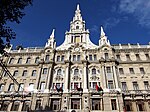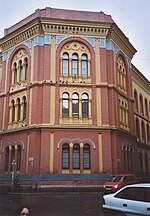Rákóczi Avenue
Rákóczi familyStreets in BudapestUrban planning in Hungary

Rákóczi út (Rákóczi Avenue) is one of the busiest arterial roads in Budapest, Hungary. It runs in an east-west direction through the city.
Excerpt from the Wikipedia article Rákóczi Avenue (License: CC BY-SA 3.0, Authors, Images).Rákóczi Avenue
Rákóczi út, Budapest Erzsébetváros
Geographical coordinates (GPS) Address Nearby Places Show on map
Geographical coordinates (GPS)
| Latitude | Longitude |
|---|---|
| N 47.497 ° | E 19.07 ° |
Address
Rákóczi út 44
1072 Budapest, Erzsébetváros
Hungary
Open on Google Maps










